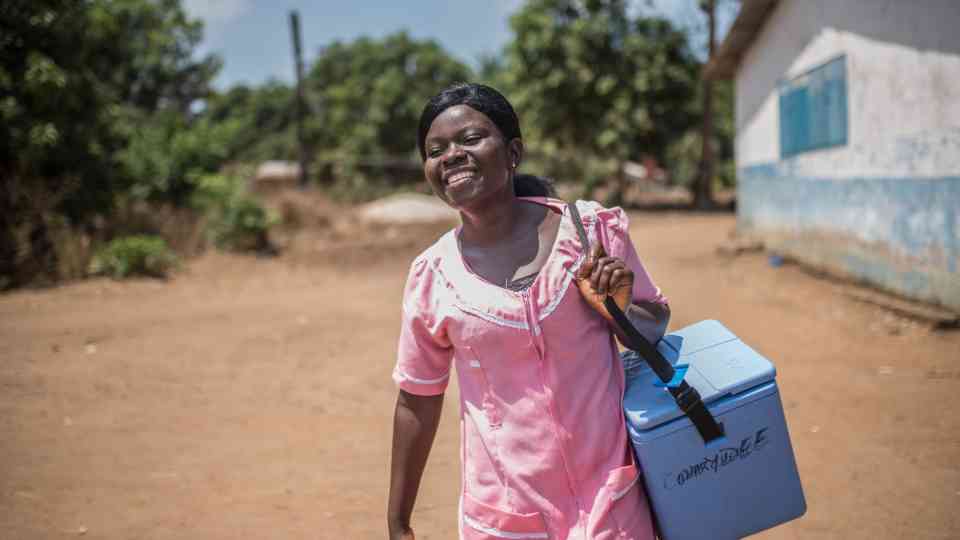The United Nations Office for Project Services (UNOPS)
Lighting up rural Sierra Leone

The Ministry of Energy’s Rural Renewable Energy Project, funded by UK Aid, will benefit up to 360,000* people in Sierra Leone by using solar energy to tackle energy poverty in rural communities across the country.
Half a million people over the next four years will benefit from at least 90 mini-grids powered with renewable energy. Initially 50 communities will be electrified in 2017 using mini-grids that will be operated by local entrepreneurs. Sierra Leone's Minister of Energy, the United Kingdom Government's Department for International Development (DFID – also known as 'UK Aid') and UNOPS gathered at the first steering committee meeting to launch the Rural Renewable Energy Project.
"Off-grid renewable energy is the future for countries like Sierra Leone," said Ambassador Henry Macauley, Minister of Energy, at the launch of the country's largest decentralized renewable energy project, funded by UK Aid, aid from the British people, in cooperation with UNOPS.
"Our country suffered greatly during the Ebola crisis," Ambassador Macauley continued. "This project will increase accessibility to renewable electricity services and enhance economic growth in underserved rural communities. It will also allow us to better respond to future health emergencies by providing much needed electricity to community health centres, paving the way to universal access to basic services."
During Sierra Leone's Ebola outbreak, the lack of reliable power generation was a major obstacle to the country's ability to both deal with and quickly recover from the emergency.
The UK Government launched an ambitious Energy Africa campaign in 2015. This aims to help Africa achieve universal energy access by 2030.
Speaking at the event, Guy Warrington, British High Commissioner to Sierra Leone, said: "The UK Government launched an ambitious Energy Africa campaign in 2015. This aims to help Africa achieve universal energy access by 2030."
"Sierra Leone can be proud that it was the first country to sign an Energy Africa compact with the UK establishing our common goals," he continued. "Improving access to energy is also a key Presidential Recovery Priority. I am delighted that UK Aid is able today to pledge £34.5 million to improve rural electrification in support of the Government of Sierra Leone's efforts to improve energy access for rural communities as part of our £240 million commitment to the recovery."
Un-electrified, mainly rural, areas of Sierra Leone usually have poor energy services, and primarily use small diesel or petrol generators and kerosene lamps. These cost 10 to 30 times more than in urban areas, which benefit from grid connection and tariffs that are often subsidized. For a comparable energy supply that costs an urban customer US$1, a rural customer will pay US$10 or more. As mini-grid generation technologies become progressively cheaper – resulting in lower start-up, operation and management costs – they can significantly reduce the amount people have to spend on energy.
"UNOPS is excited to assist the Ministry of Energy with developing such an ambitious and challenging project all over the country," said Ary Bobrow, UNOPS Director. "We are looking forward to the positive impact that electricity will bring to rural communities in terms of economic development, health, education, empowerment of women and reduction of greenhouse gas emissions. Besides providing a source of power, the project will help bridge economic divides between the country's urban and rural areas."
With the Ministry of Energy, UNOPS will assist the regulator and the private sector with developing adequate business models to sustainably operate and maintain the mini-grid infrastructure.
Project details
UNOPS is implementing the Rural Renewable Energy Project in cooperation with the Republic of Sierra Leone's Ministry of Energy and with funding from UK Aid. The overall goal of the project is to improve rural renewable energy access through private sector involvement.
The project will provide sustainable technical and financial solutions for delivering electricity to community healthcare centres and developing mini-grids in villages. It will also provide the technical assistance required to support the sustainable development of this off-grid renewable energy initiative.
The four-year project will see the installation of at least 50 solar photovoltaic systems in communities throughout the country in 2017.
The project will use an integrated approach to enhance energy security, support business start-ups, reduce local pollution and improve the livelihoods and living conditions of local communities – with special attention to vulnerable groups, including women and young people.
As a result of this Ministry of Energy-led project, up to 360,000 people in rural Sierra Leone will benefit from access to low-carbon electricity.
*This number has been revised following more accurate information becoming available.
About DFID
The Department for International Development (DFID), known as 'UK Aid,' leads the UK's work to end extreme poverty, building a safer, healthier, more prosperous world for all of us, which is firmly in the UK's national interest. We're ending the need for aid by creating jobs, unlocking the potential of girls and women and helping to save lives when humanitarian emergencies hit.
For more information about DFID, visit: https://www.gov.uk/government/organisations/department-for-international-development/about













